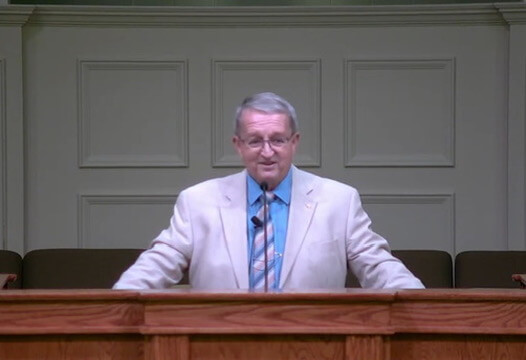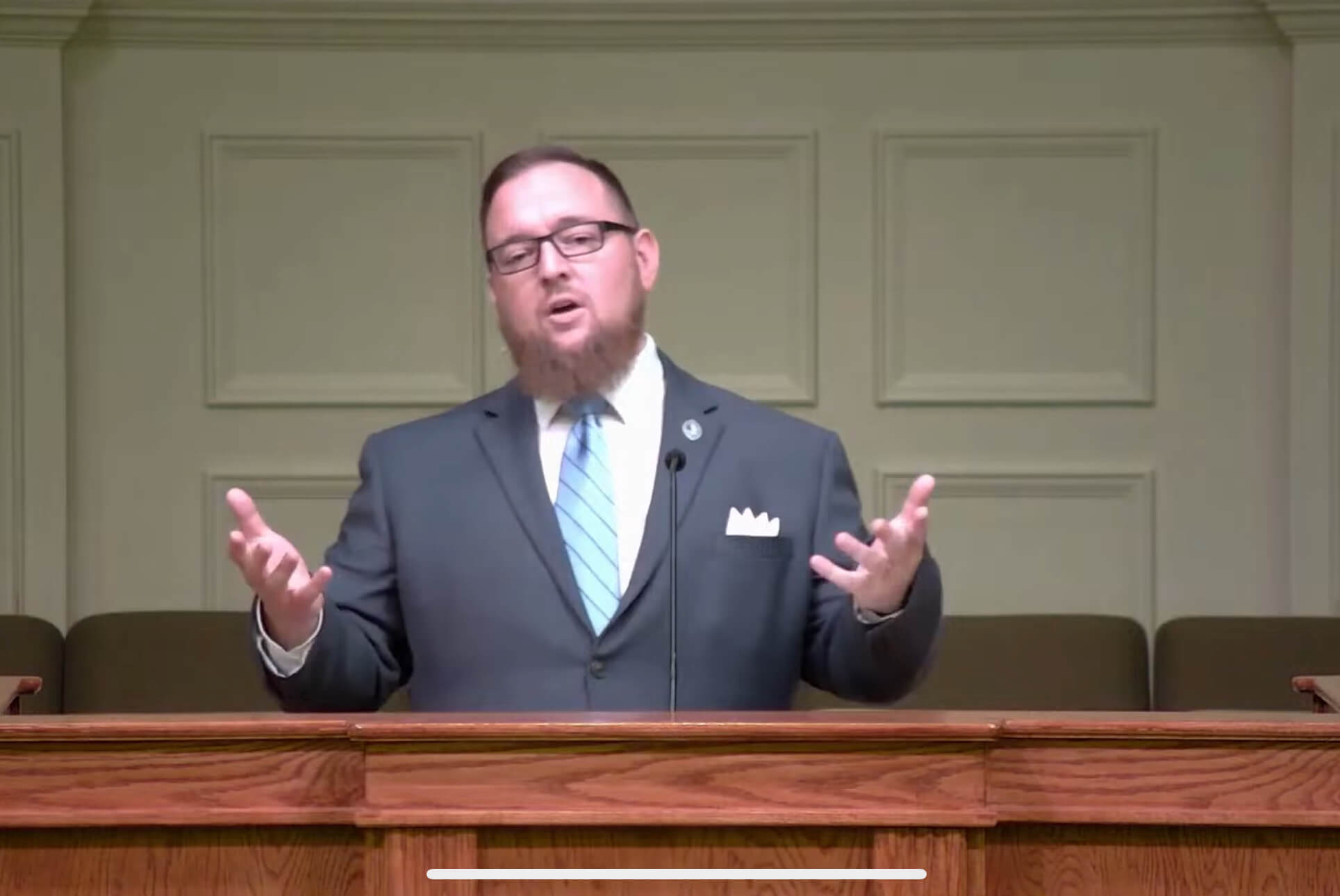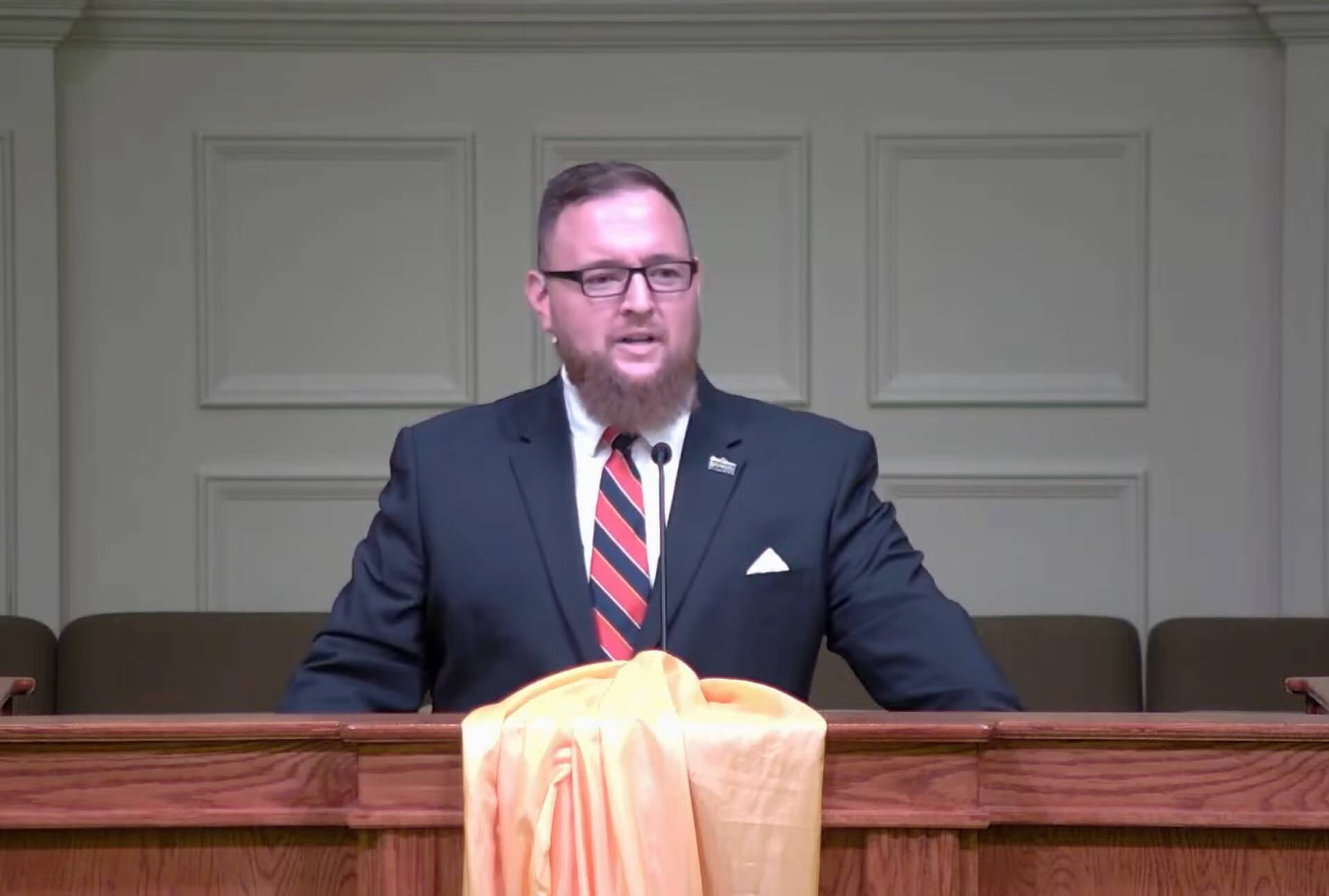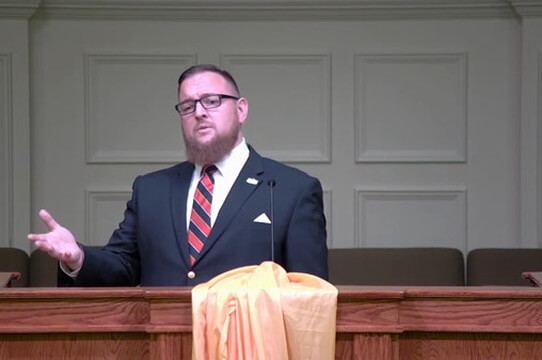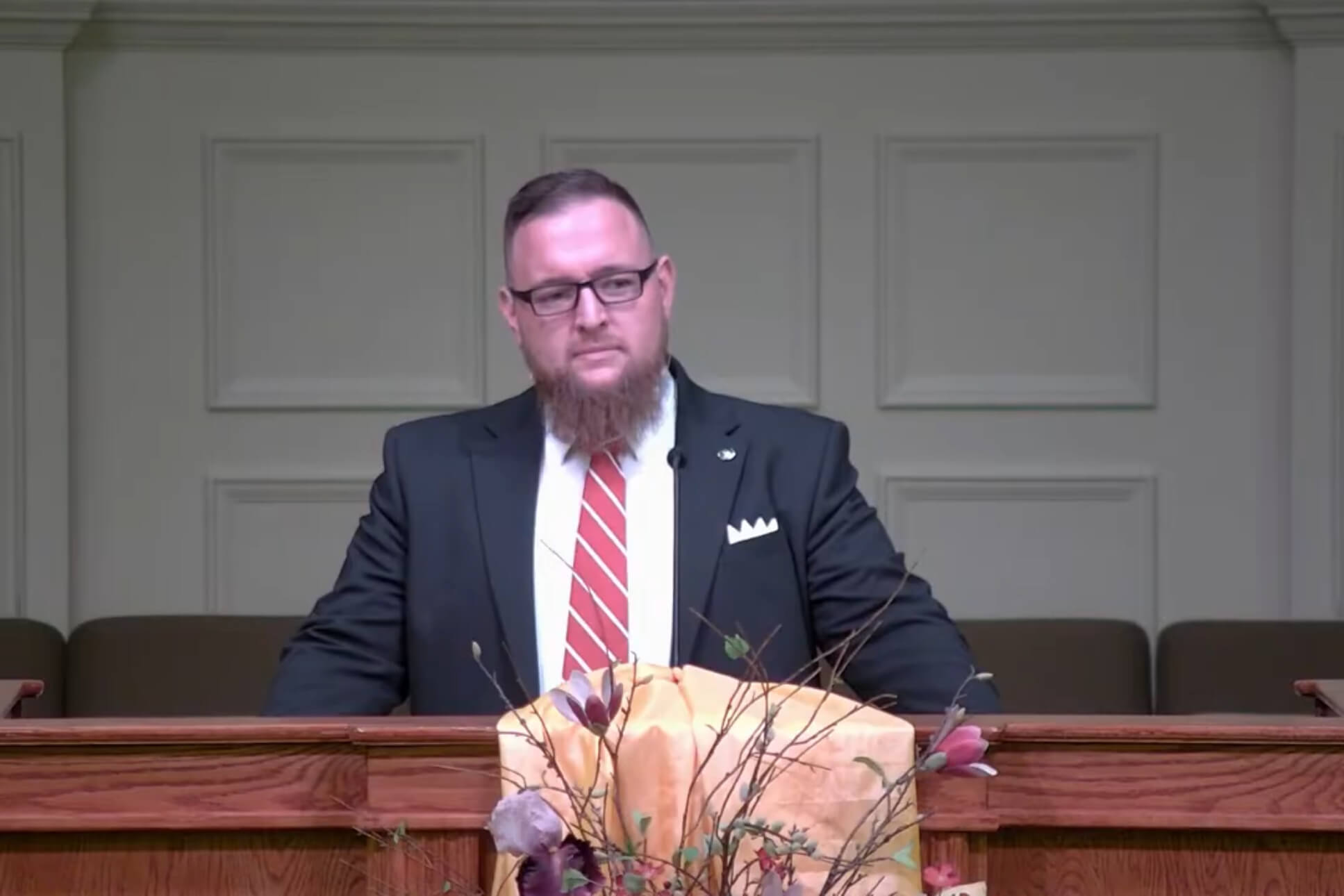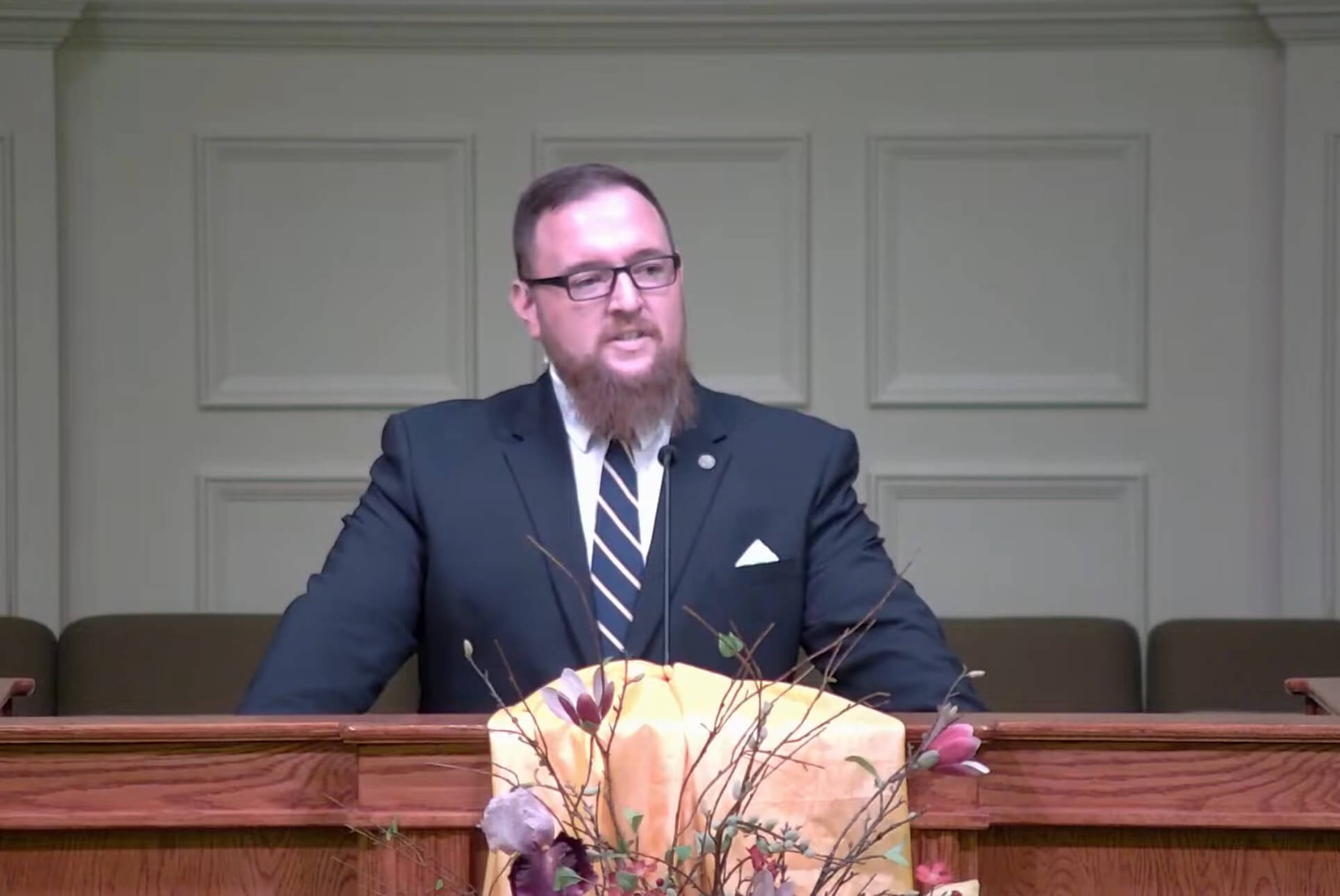Video
“Immortality Brought to Light”
1 Timothy 1:8-14
Pastor Richard C. Piatt II
11/03/24
Audio
Transcript
I don’t know if you heard it or not, but I heard, I think, one of my mentors, Dr. R.C. Sproul from Ligonier Ministry, who was co-pastoring a church over in Sanford, Florida, in my mind and in my ear, yelling and screaming as we sang that song. And it’s I and I just can’t let it go because we try to be careful that we always sing and believe as correct doctrine is as correct as we can. But I remember one time Dr. R.C. Sproul and they sing this at Ligonier his ministry and they sing it and he says I know you know but it’s a Wesley song so he kind of wrote it off a little bit because of that. But he said, God did not die. If God was to die, all that exists would ceased to exist.
You know, you gotta love him. I mean, I just so dearly love that man. And so now, you might say, but Jesus did die and Jesus was God. And that’s true, but Jesus was the God-man. God cannot die, but the God-man can die and did. And the definition of death is separation. Because you see, God the Father is spirit, and he can’t separate from a body because he doesn’t have one. And God, the Holy Spirit, who is God, cannot die because the Holy Spirit is spirit and does not have a body. Hence, God, now this is gonna sound borderline theology too, God needed a body to die. Not that I think that God is lacking in anything, but for God to die, he needed a body and that we call the incarnation.
We are soon to celebrate that at Christmas. And the incarnation is really a big deal. Because you see, without Jesus becoming incarnate and dying for our sins, there is no salvation. And that is part of the matchless the most marvelous, the most wonderful good news that this world has ever heard. And that’s what we call the gospel, the gospel of Jesus Christ. And that’s what we preach. And that’s what we believe now. So but it just doesn’t work with the meter and the and everything, the rhyme and everything of a song to say that thou, my God, man, that would that would just breed so many things. And so and we do firmly attest and believe in the deity of Christ. He is the son of God. He is God incarnate and he is the son of God. And so we never. But he had to have a body to separate. And there is some profound truth that we believe it. But wow, how do you explain it? how God became incarnate. I don’t know, but every year we celebrate it. We’re gonna do it again here real soon.
Well, take care and we’re gonna continue. That’s not just a comment on the song, but that does go along with what we are looking today because I love the title of my message. I probably in the 30 years of being your pastor, Sermon titles bother me. I they’re just hard. I mean there’s been some good ones over the 30 years. Most of them are really lousy sermon titles. But I love this one in mortality brought to light. And yet however so cool that title is it comes from the text. And so, of course, it’s good because it’s wholly inspired and Aaron, a word of God here found in the text when he is going to tell us about the gospel of Jesus Christ.
Someone has said, well, I say someone and I leave it that way because actually several people have said it to know thyself. Now that is a thing, it’s a good thought. But who actually said it first? Was it Socrates? Was it Pythagoras? It was actually one that is found in some of his writings. And there have been others. I think it’s just a common grace truth that a lot of people have said it. It’s actually on the Temple of Apollos in Ephesus. To know thyself. And that’s a good thing to know. And that’s going to be a bit of a thought today and couched in the context of 2 Timothy chapter 1. Again, you can turn there with me if you would. And it becomes a good thing for us to know. Historically, things are not so good for the early New Testament church. The people, not Christians, but the people, the populace, are starting to rat out Christians. There’s a growing hatred of Christianity. Nero, who was a real scoundrel, set to fire some of Rome and then he blamed the Christians. He eventually turned against the Jews but he also, and Christianity in the early days was really kind of viewed as kind of an offset, S-E-C-T. an off group of Judaism.
But Jews were kind of having a falling out too. But when it came to the Christian, and then they were wanting, when the Christians are taking the heat, they were wanting to distance themselves from Christians even more because of the heat, but also because they did not believe that Jesus was the Messiah. And so there was just a lot of religious confusion. There was a lot of hatred against Jews and Christians, but for different reasons, different purposes, and it was separating out. So it came to the point that Christianity became the religio illicita, the illegal religion. And there was a lot of persecution. Now in the midst of that, the Apostle Paul had been put into prison, but he had been released. And we saw that in 1 Timothy. And he went in to meet with Timothy again. Timothy was a great encouragement, was kind of his preacher boy. He was the preacher’s son. a good student for Paul, and Paul had sent him to Ephesus, and he was doing some good preaching there.
So he wrote the pastoral epistles, 1 Timothy, 2 Timothy, to Timothy in Ephesus. He also wrote to Titus, another pastoral epistle, which there’s a lot of parallelisms. I haven’t taken time to develop that, but there’s a lot of parallelisms that are there. And he wrote to Titus, who was another preacher boy, it’s called another pastoral epistle. Well, that was kind of the historical circumstance. And Paul was kind of encouraged. And we see that Paul really understood that he wasn’t going to be around forever. This dying thing and getting old and and less effective and so forth. It becomes real. Not only do more joints ache which I’m beginning to experience more and more and say does everything hurt. You know what on earth. You know maybe I should take some stock out and ibuprofen or some Tylenol or something. I know it’s got to have a future. And so you wonder, you know, you just see that. So Paul is kind of seeing his mortality.
Now, he knows that there’s an immortality to those in Christ, but he’s seeing his mortality as far as being an effective apostle and agent for the establishment of the Church of Jesus Christ. That would be the biblical one, not of the Latter Day Saints. But that’s another issue. So he was getting concerned. And well, really, in a sense of what was going on. So he writes First Timothy, but it’s still encouraging and was hoping to see him again. And he goes through and says that. important points and we’ve gone through 1st Timothy and that kind of a theme. But when we come to 2nd Timothy things had really turned south, a lot more hatred and Paul’s back in prison and he’s kind of staring down the barrel of certain death.
And so now this letter is much more personal, it is much more Passionate, as it were. We’re really talking about the things here that count, Timothy. You need to pay attention. I’m not gonna be around much longer. And we begin through that passion, begin to see the things that Paul really thinks is important for the church in dark days. And in preparation for persecution, which the church has gone through and ultimately of that great persecution during the time I’ll put it to say eschatologically the time of the tribulation until Jesus comes however there’s different eschatological interpretations of tribulation whether there is a certain we know the church goes through tribulation small t there’s confusion over some among some theologians over whether tribulation capital T seven years in the end times and what that’s like and whether the church will be there. But there’ll be believers there that know the truth. And how are we to respond?
The message of Second Timothy, Second Timothy is going to be around no matter what eschatological scheme there is. And the same thing is true. The passion that we see here And one of the things that Timothy received of Paul is the word, are some important words, and here in 2 Timothy chapter one, the important word of remember. You need to remember certain things. Now, that has actually been kind of a theme of all of scripture. There would be times when Moses, would remember, or if you read the law of the Old Testament, remember when they went to certain place. Remember when Moses spoke to the rock. And do you remember when Moses hit the rock? And to remember, remember Lot’s wife. And so remembering is an important thing because we tend to forget so much. The proverbial little statement that says, I have forgotten far more than what I have remembered. Wow, that’s not true.
And so we struggle with remembering, but we need to remember certain things. And so we find out here that Paul uses the term to remember in verse three. He said, I thank God whom I serve with a pure conscience as my forefathers did without ceasing, I remember. He goes on to say being mindful of your tears. I remember or he says with him to I that I may be filled with joy when I call to remembrance the genuine faith and that’s a key phrase because that really leads in the theme of where we’re going to go today when I remember the genuine faith. He goes on and says verse 6, therefore I remind you to stir up and then that’s the second theme that he picks up that sometimes we just need to be stirred. We need to be moved and our hearts are our passion our fervency for the things of God. And And so the concept of to remember, to stir up. But then in verse eight, he brings in another one. And this one shows us the historical concept or reflective of rather.
It reflects the historical context of the persecution that’s going on and how some Christians are handling it. And with the verbs that are used in the passage, Timothy was not guilty of this, but he’s warning him. And hence he’s warning other elders. He’s warning other Christians, be careful. This is a temptation. This is something to be concerned about. And that word is to be ashamed. Look at verse eight. Therefore, do not be ashamed of the testimony of our Lord. nor of me his prisoner. But share with me in the sufferings for the gospel. This idea of to be ashamed is not only found there in verse 8, look at verse 12. For this reason I also suffer these things. Nevertheless, I am not ashamed. I’m not ashamed that I’m suffering for Christ. For I know whom I have believed and am persuaded that he is able to keep that which I’ve committed unto him against that day. And then verse 16, the Lord grant mercy to the household of Onesimus for he is off to refresh me and was not ashamed of my chains.
So there was this growing appearance of shame because of Christ. Now keep in mind, the whole thing with Christ was there was shame associated with it. The shame of crucifixion, the shame of nudity, the shame of being crucified between two thieves. There was a lot of shame just in the very death and burial, the shame of being in a borrowed tomb. There was a lot of shame, but you also realize. that that’s also one of the strong arguments for the reality of the resurrection. These who were ashamed and nobody could produce a body. And yet their lives were so changed that even when it came to death and they were threatened with death, all of the followers did not give up. and only points to the fact that all of this was real, and that they were not ashamed. Paul would write about shame in other ways, the church at Corinth, when he would say about the shame of the gospel. Paul would mention it as well in early Romans.
So there was a lot of shame, and people would begin to fall back. And he tells, Timothy, and hence, ultimately, other elders, other pastors, but also the people of God, be warned, don’t be ashamed. Now, we looked at last week, I think it was last week, whenever it was that we were looking at this passage last, that we looked at several different things, but I kinda let this one go because I knew we’d be coming to the Lord’s table. And this is the time that we remember the broken body, the shame that was associated to that, and the shed blood, the mockery of the crown of thorns, the beating, the disfigurement, the swelling, all of the things that we would look at our Savior and people would be ashamed to call Him, that’s my Lord. When we come now and we see this about the warning of being ashamed, he then turns to them and he says, I am not ashamed of the gospel, the good news, which is that thou my God man died for me. He was, he came, he endured the pain, he endured the suffering and the pain of the cross. And those of us can hold our heads high because that’s my savior. And I identify with him, even though others may be ashamed. He’s mine and he’s precious to me. Well, that’s what we’re going to look at this morning as we take a look at this and and the gospel of Jesus Christ, because notice what he says now, verse eight.
Therefore, This is explanatory of how we’re not to be shamed and so forth, and the power of love and of a sound mind. Therefore, do not be ashamed of the testimony of our Lord, nor of me, others who are redeemed by him and living for him, his prisoner, but share with me in the suffering. And then notice what it says, for the gospel So it’s about the gospel, the good news. Then he defines what is the gospel. The gospel is that that God saves sinners. But now he’s telling Timothy, remember who you are, know thyself. Timothy, what is a Christian? Is a Christian a guy who just gives a lot of money to the church? Is a Christian just a person that goes to church? Is a Christian a person who feeds the poor? That’s what I’m seeing a lot. I have several very liberal, unsaved, but very political friends, and they seem to have it that as long as you’re a good person and you feed the poor, you’re going to heaven. I said, but that’s not the gospel. That’s a good work, but that’s not the gospel.
Well, what is the gospel? this morning as we prepare to come to the Lord’s table. Know yourself and this will help you not to be ashamed of the Lord. This will help you to define who are you? What is it? When he says according to the gospel, the gospel according to the power of God. The gospel, for I’m not ashamed of the gospel of Christ, for it is the power of God unto salvation. Jesus is my King. He is my Lord. He is my Savior. And the gospel that saves me is the power of God unto salvation. I am a saved person. I am one who’s been redeemed by the blood of the Lamb. Well, what does all that mean? Well, here he is. For the gospel according to the power of God.
So the gospel has the power of God in it. We’re going to come back and look at that. Who has saved us. and called us with a holy calling, not according to our works, but according to his own purpose and grace, which was given to us in Christ Jesus before time began. Now just in that, that is a wonderful summary. It’s one of those summaries. It’s not as complete as the Romans 8 passage when it goes through our being predestined all the way to our glorification. But this is a good one that is full of soteriological or the doctrine of salvation truth. It’s not fully complete because you have to go and look at all of scripture to develop a biblical theology on that.
But let’s take a look at this now. And there are two important points in the getting of the gospel right. The getting of the gospel right so that we understand ourselves and what has happened to us when we have accepted Christ as Lord and Savior and why this should empower us not to be ashamed and to identify with him. Well, what are those two things? Let me give you both of them. The gospel is a work of the power of God. It’s what it is. The gospel is when God, with his omnipotent, which means all power, when God in his omnipotence saves you. For God so loved the world. That’s the beginning of the gospel, that he gave, he gave his only begotten son, that whosoever, or the one who believes in him, should not perish. but have everlasting life.
How does that happen? How does a person go from non-Christian to Christian status? How does one go from death in sin to alive in Christ? How does the new birth take place? The gospel of John chapter three. How does that happen? It’s the power of God. And when you think of the power of God, You can think about as much power as you want and you’re still coming up short.
Recently we went out to Colorado and the first were actually twice one to do Chaz and Megan’s wedding and we went and saw the Garden of the Gods and we went to all kinds of things and And it is awesome. The second time we went out, we went out with the leaves and we went to just all kinds of places. We were on the desert, we were in the mountains, we saw trees everywhere. It was unbelievable. But the one thing I think is so cool about out there that, well, you definitely don’t get this in Florida, although I love Florida. I love, love Florida. are the mountains and the rocks and the strata and how that sometimes they’re like this and the way it will be cut and you look at that and say, man, that happened during the time of the flood when God in power just poured out rain and the, you know, the unformed, unfilled kind of thing happened. It just kind of comes up and water from beneath and water from above and the way that it, you just go how much power you know we just have hurricanes and get a couple of inches what about raining like that for 40 days 40 nights covers the world the power It takes a God with that kind of power.
The word there is actually dunamis, and usually people say dynamite. We tend to think of dynamite as explosive power that brings destruction. But the Greek thought was it’s just raw power. It takes a God of all power to take a dead, hell-bound, lost sinner and make him a Christian, born again. A person who deserves the wrath of God to a person who is elevated to sonship in Christ with eternal life. It is immortality brought to light. How does one, everybody wants immortality. How do you live forever? By your works? by freezing your body, or having the power and the work of God? Well, that’s the first division here, verses eight and nine.
The second, and actually some of the other following verses, but the other thing that he does is puts it in a backdrop. And he only mentions it, but it reminds you a lot of Ephesians chapter two, verses eight and nine. Look at verse nine again. who has saved us and called us with a holy calling. And now the backdrop, and it’s just a very short phrase, not according to our works, but according to his own purpose and grace. Not by our works. One thing the gospel does not have is us doing something. So the gospel is not the work of man. And so these two truths are the thing that we need to properly understand myself. One thing I can guarantee you is that if you are truly a born again saved believer this morning, it isn’t because of something that you have done or because of something that you have that you’ve avoided. If you are born again and you come to the table because you love Christ and you have been saved by his grace, it’s not because you’ve done something, it’s because God has done something. It is clearly the work of God.
It doesn’t say in 1 Corinthians, that passage I always read at communion. In this, remember what you have done. Remember that you walked an aisle or that you prayed a prayer or that you, remember me. Remember Christ and the work of God and what he has done. So let’s come back now and take a look at this very quickly, the two points for getting the gospel right. The first one is that the gospel is the work of an all-powerful God. Now, keep in mind, as he has set this up, that he’s already made mention of the fact that there’s the weakness of the Apostle Paul. Paul’s in prison, but now he’s writing about the power of God, the power under control. And as he says now, for the gospel, according to the power of God.
So the gospel is the power of God unto salvation. It’s God doing a work. We’re dead in trespasses and sins, but rather it is according to the power of God who has saved us. We could say, God, who is the antecedent of the who? Who is the subject of that? God has saved us. This brings us to an important thing that within Christianity we call between monergism and synergism. In other words, it’s actually the focal point or the break shed of Christianity and theology. How does a person get saved? How does the gospel work? Do I cooperate with God and get me saved? In other words, do I reach up?
I heard a person, our preacher one time, and what we gotta do if you wanna get saved, you reach up, and God reaches down, and God’ll keep Satan away, and the two of you can work together to get saved. That is not what the text says. For by grace you are saved through faith, and that not of yourselves. It is the gift of God, not of works, lest any man should boast. For we are his workmanship. It’s not our workmanship. God isn’t in the business of sharing glory. Salvation is of the Lord, period. It’s not me working together with God in synergism, you know, kind of like that whole thing, the different when two animals kind of can get together and like, I’m thinking of the bird eating ticks off of a rhino.
I’m sure you probably didn’t spend much time thinking about that, but I like rhinos and so forth, but that’s called a synergistic relationship. They work together. It’s kind of cool though. different rays that’ll hang on like, you know, and eat shark and eat what the shark doesn’t eat. All the ray moras and that kind of thing. Working together, it’s a wonderful truth in the natural world, but it’s not true in soteriology. Salvation is of God. It’s the power of God. I’m dead in trespasses and sins, the Bible clearly teaches. I can’t reach up, I’m a corpse, spiritually speaking. God must regenerate and bring about new birth. So it’s a work of God, the dunamis power. It’s not working together, but it is a monergism where he saves us.
But he doesn’t just stop there. He does talk about the process a little bit. when he says here, in verse nine, who has saved us and he’s called us with a holy calling. Now, Jesus will refer to that many are called, few are chosen, that God calls all men unto repentance. That is called theologically the general call. Every time I preach, or Pastor Ryan preaches, there is a general call that goes out. Believe on the Lord Jesus Christ and thou shalt be saved. Some, if you look at it in one way, it’s not only a call, but it’s a command, but not everyone obeys.
But to believe, we call upon sinners to repent of their sins, but they can and won’t unless God calls them specifically. being chosen. Jesus referred to the group when he talked about all that the Father has given unto me, they will come unto me and I will in no wise cast out. There’s a general call, there’s some who think they’re called but they’re not really, they’re just thinking of some other kind of escape mechanism for say their skins or their necks. But they’re not ready to ask and really desire Christ to be their Lord and Savior. And so we have this idea of a calling.
There’s the general call, but the effectual call. That is the time, if I don’t know what your experience is, many, maybe not all, but many have the experience that I never heard such a clear presentation of the gospel. You probably heard the same words. It’s just at that time, God called. It used to be those that would refer to the white knuckling. You know, that their knuckles as they would hold on to the back of the pew if there was a public invitation. When they hadn’t heard and they thought they could resist.
And is God’s grace resistible? Not ultimately. Because you’re gonna say that your power and your will is worth more and stronger than God. It says here that the whole process is the power of God. And we can resist. Now there are theologies, Arminian theology, would go ahead and think of the synergism, working together with God. They’d go ahead and see some freedom of will and so forth. There’s all kinds of things that come with that. But this is the work of God. So he goes on to say, the gospel according to the power of God who has saved us, who has called us.
But notice what the calling is. It’s a holy calling. Now holy, the main idea of holy is separate or of a specific purpose. It is, there is a call with respect to the purpose of bringing around a result. It is, why does God save people? Well, it’s found in the passage, the holy calling, not according to our works, because we can’t work to be saved, we’ll come back to that, but according to his own purpose. What is the purpose of God to save people? Well, ultimately, it’s to bring glory unto himself. It is according to his own purpose and grace, which was given us in Christ Jesus.
Remember that passage, Romans eight again, and we know that all things, all things work together for good to those who are called according to his purpose. We read in Ephesians chapter one, he is the God who works all things after the counsel of his own will. God is saving a people unto himself and salvation is the good news that he saves sinners by his own power for his own glory for his purpose. And it’s all in grace. What is grace? Something is that is not merited. You can’t be good enough. It’s not a payback. Hey, I’m going to see, you know, I could really use so and so here. So I think I’ll save them.
So that that’s not that at all. It’s all by grace and mercy. I am a sinner saved by grace and grace alone. That was part of the mark of the whole Reformation, sola gratia, that it’s by grace alone. There’s no merit. There’s nothing that can be earned for it. It’s the grace of God through the work of Christ. Verse nine, when he goes on, which was given to us in Christ Jesus. Now what makes this even more special is he says, how secure, see this is again, you need to understand yourself. He put this in the couch, couched in the text of a lot of persecution, Christians are scared, but I’m saved. Well, am I really saved? And how strong is the purpose? And what could happen? And I could slip through God’s fingers. which was given to us in Christ, is God of Indian giver.
Secondly, in Christ before time began. The eternality of the plan and purpose of God. That’s the reason why, when you get into this thing of open theology and the openness of God, can God think of a new thought? Can God back off a little bit? Oh, wait a minute. I think that makes God way too small. See, they usually say, no, what that does is you put God in a box and he can’t think a new thought. I’m saying God has thought all thoughts that could ever be thoughted and there’s no more thoughts left. And it’s way beyond anything that we could ever know. And I do know this, it all was before anything, before time began. In the book of Ephesians, and he goes through the Godhead in that first chapter. Ephesians and it’s he talks about being blessed in the heavenlies and how God kind of works these things out and how that is done and when we come to Ephesians chapter 1 and it talks about I’ll begin in verse 7 since it’s in Christ it says in him We have redemption through his blood, the forgiveness of sins, according to the riches of his grace, which he made to abound toward us in all wisdom and prudence, having made known to us the mystery of his will, according to his good pleasure, which he purposed in himself.
This is all according to purpose. There is a plan, and God’s working his plan. Verse 10, that in the dispensation of the fullness of time, he might gather together in one all things in Christ, which are in heaven and which are on earth. In him, in him we have obtained an inheritance, having been predestined according to the purpose of him who works all things according to the counsel of his own will. Salvation, before time, the plan, God, all power, head of all time, put it all together to the purpose of Him who works all things according to the counsel of His will, that we who first trusted in Christ should be to the praise of His glory.
You’re gonna worry what Nero can do to you? You’re just gonna die, you’re gonna die anyways. Get some spiritual backbone. Why on earth would you ever be ashamed of so great a salvation? That Christ died for me. He obtained an eternal inheritance for the glory of God according to his eternal purpose before time began. But now, verse 10, but now it has been revealed by the appearing of our Savior, Jesus Christ. That appearing is in reference to his resurrection. He’s abolished death, brought life, And in the midst of the resurrection and being saved, he has brought to light, he’s revealed immortality to light through the gospel.
Immortal, invisible, God only wise. In light, inaccessible, hid from our eyes. What’s hid? God, the truth. until He gives us eyes to see, a heart to believe. And He’s done it all. It’s a complete plan. And if you know Christ, you are saved, saved eternally, kept saved by God Almighty. And we are for the praise of His glory. And it’s all in His power. Well, it’s a singular act. It’s in Christ and in Christ alone. It’s complete. None are lost. All that the Father’s given to me will come to me and I’ll no wise turn out. It’s eternal from before time began. God is the author of our salvation. Now that’s just the first point.
Second point’s much easier. It’s only got a little bit of a phrase there. The gospel is not a work of man. It’s not a work of man. Now we participate in it and that confuses people. I know the age old thing. Does man have free will? I like to put it this way. Man does not have a free will. Man has free agency. That is, man’s will is free within the realm of his nature. And if you’re still in sin, sinners every day make decisions and exercise their will, whether to go through a red light or not. But that doesn’t they don’t have the will to get themselves saved. Because you see, they’re dead in that realm. That’s why they gotta be made alive first. Salvation has got to be the work of Almighty God. And when presented with the facts, with eyes that have been able to see, we say, Lord, I believe, help thou my unbelief as the man in the gospel of Mark.
Getting the gospel right gives us confidence. Getting the gospel right helps us with a proper understanding, a proper doing, and then verse 13, this is what we do with that. If you know yourself and the salvation that you have, then this is how you will respond. Hold fast the pattern of sound words which you have heard from me in faith and love which are in Christ Jesus. That good thing which was committed to you, keep by the Holy Spirit who indwells us. Praise be unto God. How great a salvation. That’s all pictured this morning in the time that we have here this morning at the table. Do this in remembrance of me, our Savior.
Let’s pray. Our Father in heaven, as we come to the table, may we rejoice at the accomplished, finished work upon the cross of Calvary. As our Savior cried out that word, Tetelestai, it is finished. There is nothing for us to add. We participate, but we don’t do the work. And Father, we rejoice because it’s all in Christ. We pray this to his praise and glory in Jesus name, amen.
